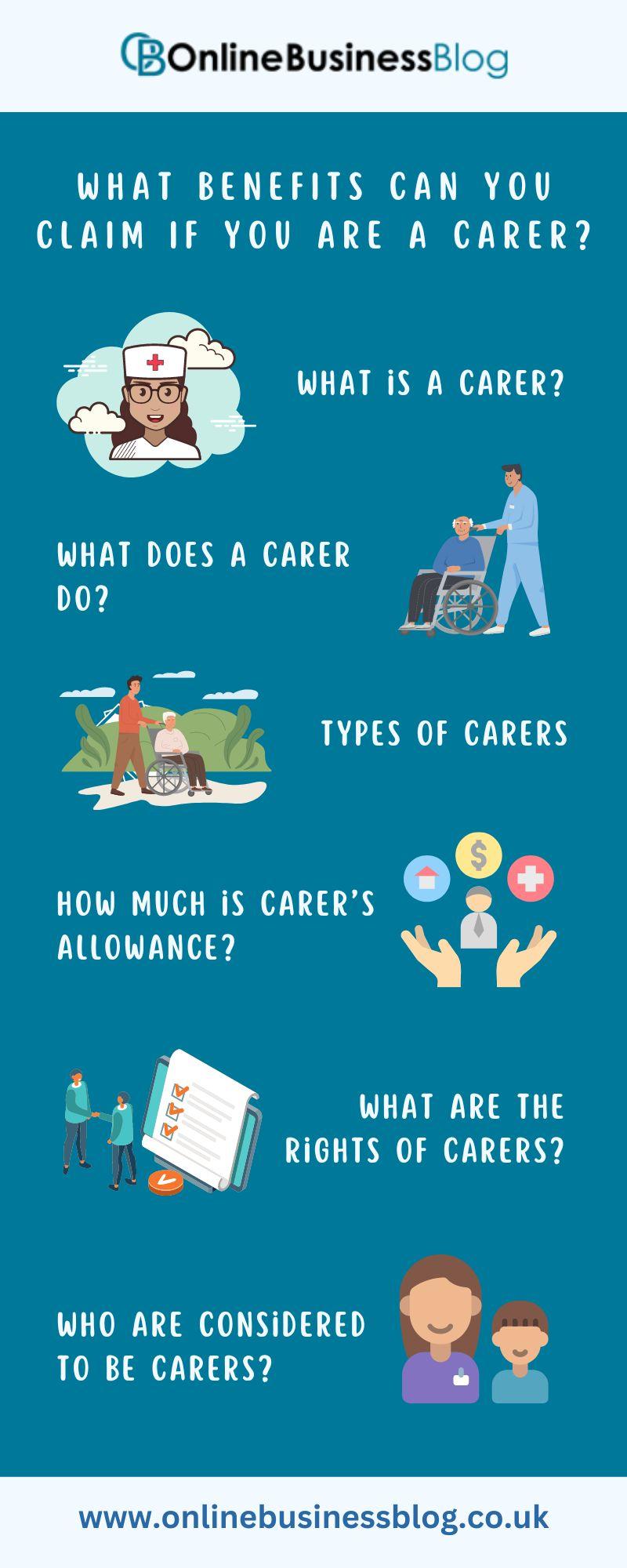Post Contents
Introduction
As we all know, the world is getting smaller and the jobs market is slowly evolving. With this in mind, it’s important for businesses to be aware of the needs of their employees. This includes things like flexible working hours, adequate rest, and a healthy work-life balance. If you are a carer, you may be wondering what your rights and benefits are. In this blog post, we will explore some of the benefits that carers can claim and how you can take advantage of them. From sick pay to maternity leave, read on to learn more about the rights and benefits that carers have at their disposal.
What is a Carer?

People who give care to others are often given a lot of leeway in their day-to-day lives. This is because taking care of someone else is often seen as an honorable and important job.
here are a number of benefits that can be claimed if you are a carer, such as:
• You may be able to claim Carer’s Allowance or Income Support.
• If you’re caring for someone with a long-term illness or disability, you may be able to claim Personal Independence Payment (PIP).
• If you’re providing regular care for someone who has dementia or Alzheimer’s, you may be eligible for the Carer’s Support Grant.
What Does a Carer Do?

A carer is someone who provides unpaid assistance to a person with a disability, elderly person, or child. This can include providing general support and assistance with personal care, helping with activities of daily living (ADLs), assisting in medical appointments, traveling to and from appointments, or providing companionship. Carers can also be used for respite care services for people who are unable to take care of themselves. There are many benefits that can be claimed by carers, depending on the situation they are in.
Types of Carers

There are a variety of benefits that carers can claim, depending on the type of care they provide. These benefits can include tax breaks and help with housing costs, as well as support from government agencies and charities.
Here is a list of the most common types of care:
1. Caring for a family member with a disability or illness: Carers who care for someone with a disability or mental health condition can often qualify for benefits such as Personal Independence Payments (PIP), which can help cover the costs of living independently. In some cases, carers may be able to claim bereavement benefits if they lose their loved one while they’re caring for them.
2. Caring for elderly family members: Elderly carers may be able to claim pension credit and other government benefits, such as the State Pension Credit. These benefits can help cover the costs of basic needs like food and shelter, as well as medications and other medical expenses.
3. Supporting children and young adults: If you’re caring for someone who’s not your own child or relative, you may be able to claim Child Tax Credit (CTC) or Working Tax Credit (WTC). CTC provides financial assistance towards the cost of raising child benefits, while WTC helps working families get ahead in life by paying taxes on their earnings.
4. Helping people with disabilities: Carers who provide regular support to people with disabilities may be able to receive Disability Living Allowance (DLA), which can help cover the costs of basic needs like food and shelter. Carers may also be able to claim Carer’s Allowance, which is a government subsidy that helps with the costs of caregiving.
5. Supporting the elderly: If you’re caring for an elderly family member, you may be able to claim a Pension Credit, which can cover the costs of basic needs like food and shelter. You may also be able to claim benefits such as the State Pension Credit or the Winter Fuel Payment, which helps low-income families heat their homes during colder months.
How Much is Carer’s Allowance?

Carer’s Allowance is a tax-free benefit that can be claimed by people who are caring for someone who is ill, elderly, or disabled. Carer’s Allowance is different from Personal Independence Payment (PIP), which is a benefit that is awarded to people who have an impairment that makes it difficult for them to live independently.
If you are claiming Carer’s Allowance, you will need to provide evidence of your care responsibilities. The amount of Carer’s Allowance you receive depends on the level of care you provide. The following table shows the maximum amount of Carer’s Allowance that can be awarded per week.
Level of care Maximum weekly allowance Aged 18 or over £159 Aged 16-17 £131 Aged 14-15 £103 Aged 12-13 £68 Under 12 £35 The amount of Carer’s Allowance you receive will also depend on how long you have been providing care for the person you are caring for. If you have been providing care for more than six months, you may be able to claim additional benefits, such as State Pension Credit or Attendance Allowance.
What Are the Rights of Carers?

Carer’s rights vary between countries, but generally, the carer is eligible for benefits such as health and liability insurance, social security payments, and a pension. In some cases, the carer may also be able to claim compensation for time away from work.
The rights of carers vary depending on the country in which they reside, but generally, the carer is considered an essential member of the family and is given preferential treatment when it comes to employment and social benefits. In many cases, the carer is also entitled to receive a percentage of their partner’s pension entitlement.
There are a number of laws that protect the rights of carers, including provisions in disability legislation that allow people with disabilities to remain in their homes while they are receiving support from either a relative or a friend.
It is important to note that not all countries have equivalent protection laws in place and some carers may not be aware of their rights. If you are a carer and believe that you have been discriminated against or wrongfully dismissed from your job, you should speak to an experienced employment lawyer who can help you pursue your legal rights.
Who Are Considered to Be Carers?

There is a range of people who can be considered to be carers, including parents, grandparents, siblings, and children. If you are caring for someone who is ill or has a disability, you may be able to claim benefits such as incapacity benefit, carer’s allowance, or personal independence payment. You may also qualify for tax credits if you’re working as a carer.
What Benefits Can You Claim if You Are a Carer?

If you are a carer, you may be entitled to a range of benefits including:
Bereavement benefit: If you have been caring for someone who has died, you may be eligible for a bereavement benefit. This can give you up to £8,000 per year.
Carer’s allowance: If you are caring for someone who is incapacitated due to old age, ill health, or disability, you may be eligible for a carer’s allowance. This can give you up to £10,000 per year.
Parental leave: If you are the primary carer of a child under 16 years of age, you may be eligible for 12 months of parental leave. You will also be able to take unpaid leave if your partner is also taking parental leave. This can give you time off work to look after your child.
Employment and support allowance (ESA): If you are being paid by your employer as an ESA recipient, this can provide financial assistance while you are looking after your elderly or disabled relative or friend. You will need to meet certain eligibility criteria in order to receive ESA.
State pension: If you have been caring for a relative or friend who is claiming a state pension, you may be able to claim a share of their pension. This can give you an income that is higher than the basic state pension.
Tax credits: If you are caring for a relative or friend who is eligible for tax credits, you may be able to claim these credits on their behalf.
Personal Independence Payment (PIP): If you are caring for a relative or friend who is receiving PIP, this can provide financial assistance while they are living in your home.
Attendance allowance: If you are caring for someone who is unable to attend school or work because they are ill, you may be eligible for an attendance allowance. This can give you up to £200 per week.
Carer’s leave: If you are caring for someone who is temporarily incapacitated due to illness or injury, you may be able to take carer’s leave. This can give you up to 12 weeks off work.
Bereavement pay: If you have lost a loved one through death, you may be eligible for bereavement pay. This can give you a sum much money which is based on your relationship with the deceased.
Disability living allowance (DLA): If you are caring for someone disabled, you may be eligible for DLA. This can provide financial assistance while your relative or friend is living in your home.
How to Claim Carer’s Allowance and Tax Benefits?

If you are a carer, you may be able to claim Carer’s Allowance and tax benefits. To claim Carer’s Allowance, you need to provide evidence that you are providing unpaid care for someone else who is registered with the Department of Social Protection. You can either provide a letter from your care provider or a declaration form from the Department of Social Protection.
You will typically be entitled to up to 16 weeks’ worth of Carer’s Allowance, depending on how many hours a week you spend caring for your loved one. The maximum weekly rate of Carer’s Allowance is €188.60. If you qualify for Statutory Maternity Pay (SMP), the weekly rate of the Carer’s Allowance is increased by 50%.
You can also claim Tax Relief on your income earned while claiming Carer’s Allowance. The relief available depends on your income and circumstances but can include up to 40% of your earnings. To learn more about claiming tax relief, visit the Revenue website or speak to a tax advisor.
Conclusion
As a carer, you go above and beyond the call of duty each day. You have to balance your own needs with those of your loved ones, sometimes making difficult choices. Here are some of the benefits that can come from being a carer: -You develop strong bonds with your loved ones that can last a lifetime. -You learn how to cope with stress and manage challenges head-on. -You gain intimate knowledge about your loved one’s life and what makes them happy. -You build up empathy for others and become better at dealing with difficult situations.


